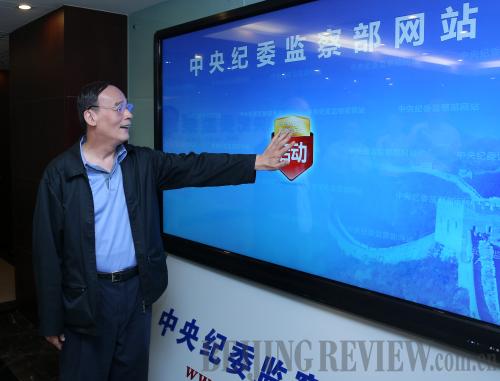Fighting corruption requires constant vigilance and commitment
- By Eugene Clark
 0 Comment(s)
0 Comment(s) Print
Print E-mail China.org.cn, November 7, 2013
E-mail China.org.cn, November 7, 2013
It is anticipated that corruption will be an important agenda item at the Third Plenum of the 18th Communist Party of China (CPC) Central Committee, to be held between Nov. 9 and 12. The CPC is expected to promulgate new rules and procedures to combat corruption.
|
|
|
Wang Qishan, Secretary of the Central Commission for Discipline Inspection of the Communist Party of China, launches the commission's official website in Beijing on September 2 [Photo by Pang Xinglei] |
Combating corruption, of course, is not a once-off event and it is good to see a number of new actions regularly and systematically being undertaken and read reports about investigations and prosecutions focused on corruption. Corruption at government levels is especially insidious because such corruption is the antithesis of public service and tends to undermine public confidence and trust in authority.
An example of China's commitment to an ongoing campaign to fight corruption is the recent announcement of new rules issued by the Organization Department of the CPC Central Committee to regulate the conduct of incumbent and retired officials, in order to prevent and prosecute corruption. What I like about this new set of rules is that it recognizes that corruption is not just about the obvious direct forms of bribery of public officials. Corruption indeed often involves indirect forms of self-serving conduct in which one illegally and unfairly uses his/her position or former position to influence a decision in return for that retiring or retired official to receive some direct or indirect personal benefit.
The various steps to combat corruption are based on the principles of good governance, including transparency, avoiding conflicts of interest, impartiality, fairness, transparency, restrictions on private profiting, prohibitions against insider dealing and required disclosures. Fighting corruption requires a sound policy framework, effective operational rules and diligent enforcement as well as the establishment of a system of checks and balances to prevent abuses of power. Effective programs are also proactive in creating and nurturing a government bureaucracy and public service culture of zero tolerance of corrupt behavior.
A frequently occurring opportunity for conflict occurs when retired officials or officials who are about to retire end up working in private enterprises and engaging in profit making activities related to their former positions. Such situations can be open to abuse, for example with retired officials receiving payments, stock options or other benefits based on dealings with their former department. It is therefore important that appropriate rules exist and the officials concerned adhere to strict protocols in terms of approvals, reporting and regular monitoring and review.
It is important to realize that corruption not only undermines trust and confidence in authority, but it also undermines and frustrates efforts for needed reform for China to continue on its path to a more prosperous future. This is because using a position for private gain is not in the public interest, which is what government should be concerned with.
Systemic corruption is often a component of departmental culture. China should do all it can to promote a culture of the highest form of public service dedicated to the highest ethical standards in every department and at every level of government. Retired officials using their former positions for their own private benefit and behind-the-scenes deal-making are the antithesis of public good.
When a country is proud of its public service then its government is also able to attract the brightest and best minds who are eager to lend their hands to the task of nation building. People want to be associated with an organization that they believe in and that does good and important work. Corruption undermines such aspirations and impedes the progress not only of government, but also of society as a whole. Developing effective measures to fight corruption step by step, will be vital if the Chinese Dream is to become a reality for all Chinese citizens.
The author is a columnist with China.org.cn. For more information please visit:
http://www.keyanhelp.cn/opinion/eugeneclark.htm
Opinion articles reflect the views of their authors, not necessarily those of China.org.cn.






